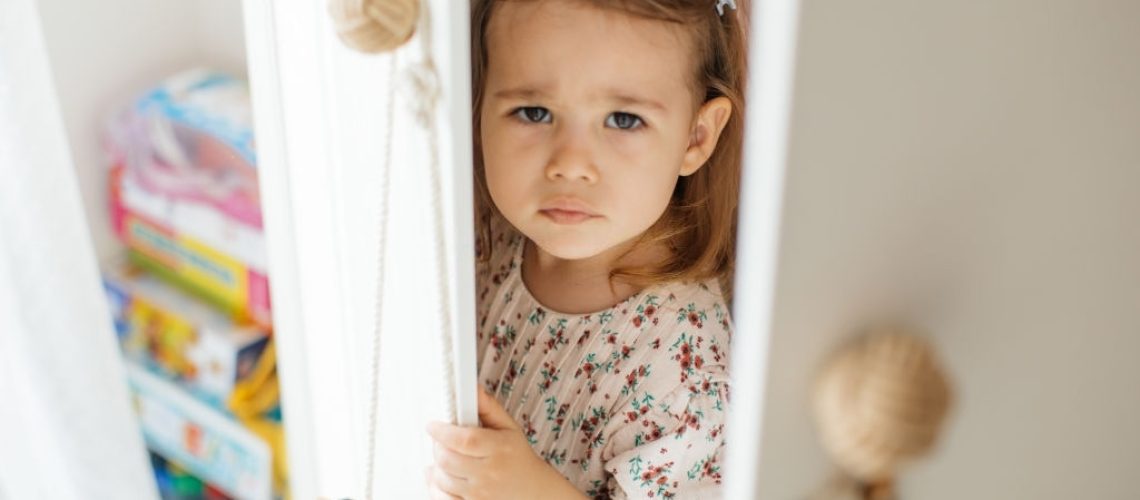The feeling of embarrassment can be overwhelming to a child, and when this happens, it can create more problems than solving them. Children are easily embarrassed, whether by the way they look or a particular comment made by a teacher. Therefore, it is essential to understand how to deal with embarrassment to prevent feelings of shame and make your child feel comfortable with himself.
We can’t always protect our children from embarrassment, but we can help them build self-confidence and the resilience to deal with it in a healthy way. In this article, we will look at ways in which your child can cope with the experience of being embarrassed. Also, the article will help parents to understand and deal with their child’s embarrassment.
When Is a Child Most Likely to Feel Embarrassed?
It may happen during the preschool years when your child learns how to cooperate with others and act appropriately in public. By the time your child reaches school-age, he’ll be more likely to be embarrassed by situations that involve peers and other children. But eventually, your child will learn to handle embarrassment in a mature way, especially when you show him how.
How Can I Tell If My Child is Feeling Embarrassed?
Sometimes it can be difficult to tell whether a child is embarrassed, but there are ways to detect it. For example, if you ask your child what he feels when he’s embarrassed, and he says something like, “I feel ugly,” “I feel stupid,” or “Something’s wrong with me,” then you know that a feeling of embarrassment is present.
Here are some signs that can help indicate whether your child is feeling embarrassed:
- Sudden changes in body language or facial expression.
- Acting withdrawn, and quiet, almost like the child is in a trance-like state.
- Being self-conscious of the way the child looks to others, such as tugging on his ear or making a funny face.
- Becoming very emotional, possibly to the point of screaming or crying uncontrollably from embarrassment.
- Obvious changes in behavior, a child becomes over clingy to someone for reassurance or refusing to go out on their own to play with other kids.
- Saying things like “This is stupid,” “I knew I shouldn’t have done that,” or “It’s not fair.”
- Inability to read social cues such as facial expressions and tone of voice.
- Being overly compliant, perhaps by carrying other people’s bags or offering to help with chores, without knowing why they are doing it.
- A strong sense of inferiority or feeling worthless (especially if your child feels he is an outsider).
- Child gets upset when others laugh at him, or he feels left out of the group.

How Can You Help Your Child Cope With Embarrassment?
1. Figure Out What Caused the Embarrassment
If someone made fun of your child, for example, ask your child what happened. The more details about the incident you can gather, the better equipped you will help your child deal with the situation. Figure out what embarrassment means to your child: Remember that all children are different. Just because one child is embarrassed by being made fun of doesn’t mean that all children will react the same way. Find out what your child thinks the feeling of embarrassment means and how they respond to it.
2. Talk to Your Child About the Incident
After you learn what happened, explain to your child how they felt embarrassed and offer them words of advice on how to handle this situation in the future. Depending on how old your children are, explain embarrassment using age-appropriate terms. If you have multiple children, you may need to tailor the conversation with each child so that they all understand embarrassment in the same way. For example, you can tell your child that while he may feel embarrassed now, he won’t always feel like that. Tell your child that everyone feels embarrassed sometimes, and it’s a natural feeling. Explain that most people learn from it and move on. Be sure to keep the conversation factual, age-appropriate, and positive.
3. Discover What Helps Your Child Feel Better
If your child is embarrassed by something that happened, help them find ways to make themselves feel better. For example, if a classmate made fun of your child for wearing funny clothes, encourage them to seek comfort from a parent or close friend. Likewise, if your child is embarrassed by a mistake they made, help them think of ways to correct their error or reassure them that it was an accident and not a big deal.
4. Share an Embarrassing Experience with Your Child
If you have a personal experience that was embarrassing at the time, but you managed to get past it, share your story with your child so they know they will be able to move on after feeling embarrassed. Explain how you felt at the time of the incident, how you overcame the embarrassment, and what you learned from it, so it doesn’t happen again in the future.
5. Encourage Your Child to Share His Feelings with You
If your child is hesitant to talk to you about what happened, build a trusting relationship with them. For example, let them know that you won’t be upset or angry if they feel embarrassed and that you want them to feel comfortable talking about it. Sometimes it helps if they think through how a conversation will unfold before actually having it. It gives them a chance to think of ways to explain the embarrassing situation and how they want their parent/caretaker to react.

How to Help Your Child Handle Embarrassment at School
A child who experiences the stress of getting back to school or transitioning to a new school environment may show discomfort by withdrawing from social activities, being self-conscious, changing diet, and sleeping patterns. In addition, he will likely deal with feelings of embarrassment quite often. That is why it is important to provide support and help your child develop coping skills that will allow him to move past his feelings of embarrassment. Here are some tips to help your child handle embarrassment at school.
1. Remind your child that they are not alone and remind them that it is okay (and every day) for them to feel embarrassed or hurt at school.
2. Let your child know that the best way to deal with embarrassment at school is finding a friend and having them help work through it together.
3. If your child gets teased often, consider talking to your school about it. Explain how the teasing affects your child academically or behaviorally, and suggest that you and school staff work together to help encourage a respectful environment.
4. Suggest that your child agrees on a safe word with their friends or classmates if they feel embarrassed at school. If they hear their “safe word” while in class, they know it’s time to step out of the classroom.
5. If your child has some support at school, they will feel more comfortable talking with a teacher about what happened. They will also be more likely to seek help from their school if they feel embarrassed in the future.
6. Have them try to remember what it was like before they got teased about something embarrassing so that when he is feeling embarrassed in the future, you can remind them of how it felt the first time and how that doesn’t have to happen again.
7. Have a friend or parent at school show the teacher a picture of your child being teased or bullied if the teacher needs it as evidence.
How Can You Help Others Understand Your Child’s Feelings Of Embarrassment?
If you notice that someone is making fun of your child or seeing your child feeling embarrassed by something, try to approach the situation with a positive outlook. Please resist the urge to reprimand whoever made fun of your child or tell them to stop.
A better approach would be to ask the person not to make fun of your child and allow them to know that this behavior is not okay. If the situation is more complex, such as if a bully is making fun of your child, you may need to intervene and talk to the bully about the problem.
If you see your child displaying an emotion he does not understand, try to explain it and show them pictures of other people experiencing the same feelings. It will help build your child’s self-awareness and make them more comfortable with the emotion.
Teaching your child how to handle embarrassment is a valuable lesson that they will carry throughout their lives. By helping them identify what they are feeling and learn how to manage these emotions, you can help your child become more confident and secure in themselves.

